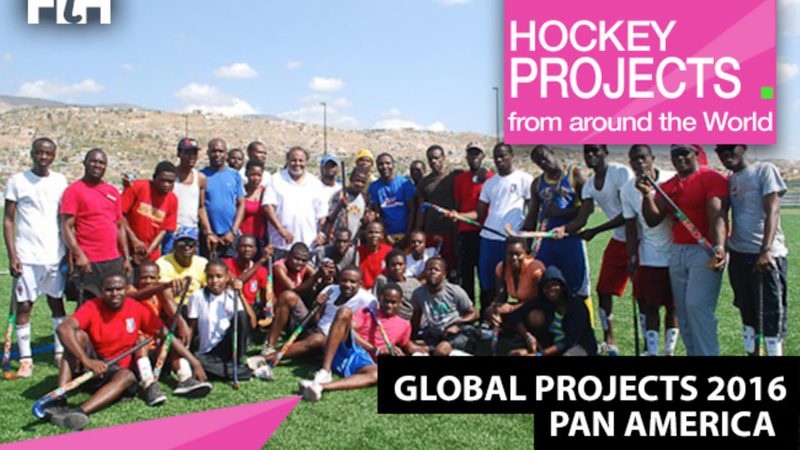
As part of our series looking at some of the standout Global hockey Projects from 2016, we look at some projects in the Pan-American region that have the potential to inspire others in 2017...
Nations with no pitches and limited resources are always going to struggle to compete on an international stage, but as two of these stories prove, a little support can go a long way.
In it for the long haul
Hockey has been developing at pace in the Central American nation of Guatemala, driven on by the Guatemalan Hockey Association President Pablo Reyes and his enthusiastic team.
It has been a tough slog as the President explains: “We started our journey 10 years ago but in the first five years, there weren't many balls and sticks – in fact no-one sells them in Guatemala – few places to play, few teams to play. To keep the interest of the people was not easy.”
A simple but effective strategy was used. First they got the 15-25 year-old men playing, many of whom were physical education teachers. These players introduced the sport into schools and clubs and began to target the 10-14 year olds. Eventually, sisters, friends and relatives also began to take an interest in playing the game.
There are now 250 registered players and many more who play informally. The pace of change increased last year when the Association won the Pablo Negre Trophy, an annual award given by the FIH to a national association which has either worked hard to develop hockey in the country or has shown outstanding dedication to embracing the spirit of the sport.
In the case of Guatemala, both criteria have been met and the result is a brand new pitch from FIH Global Supplier Polytan, while Musco Lighting will provide a lighting system at a designated location within Guatemala within the next few months.
A delighted Reyes said: ‘The award is fundamental for us because it means we can take our hockey to the next level. The dedicated pitch will help to develop hockey in all Central America. Guatemala will be the principal beneficiary, of course, but we want to share this award with our neighbours.”
No boundaries in Chile
When you are 14 years old, have been bullied at your previous school and spend most of your time in a wheelchair, then learning a new sport is a big undertaking. But Micaela Sarzosa has done just that.
The Chilean schoolgirl was born with Imperfect Osteogenesis, a disease that has a severe impact upon a sufferer’s mobility.
Micaela explains: “I was born with this disease which means my bones break easily. I have used a wheelchair all of my life, but I am now beginning to learn how to stand-up and walk.”
Rather than let the disease beat her, Micaela is determined to do all she can to lead a normal and healthy life, which means incorporating exercise into her daily activities.
“At first, I was going to participate in the Swimming Academy at my new school, but hockey is part of the curriculum and my teacher invited me to take part. I had never played before, but my friends were playing and the sport attracted me.”
Micaela’s family were not keen for her to take part in hockey at first; they feared that she might get injured or feel uncomfortable and excluded as she was the only player in a wheelchair. But the plucky schoolgirl was determined to have a go and now she is a regular at the team practices.
“I have been feeling really well since I took up hockey, and now my family are happy for me to play, they can see how much good it does physically and for my mind and mood as well. I would like to show others in my situation that this is possible. I have been integrated into hockey at my school and further integration in other sports is also possible.”
Hockey sticks not guns in Haiti
Hockey thrives in the most unexpected places. After an earthquake hit the Caribbean island of Haiti in 2010, the communities around the epicentre in Leogane – just 25 kilometres from the capital Port-au-Prince – were devastated. Apart from the dreadful loss of life, homes, schools and other buildings were destroyed in the catastrophic natural disaster.
Despite this, in 2013 the Haitian Hockey Federation was formed and, by 2016, more than 4,560 players regularly compete. An achievement made even bigger when you consider the island has no official hockey pitch.
“We strategically use basketball courts and the facilities used by other sports to train,” explains President of the Haitian Hockey Federation (HHF), Aubens Henker Fermine.
For the HHF hockey has become much more than purely a sport. “The people living here are in a bad situation. As a sports federation, it is not just the sport you are developing but you are dealing with all social and economic problems. Just three years after the earthquake, 1,200 children from shanty towns and slum areas were playing hockey. Right now these children have a stick in their hands rather than a gun. Through hockey we give them an alternative to alcohol, drugs and prostitution.”
Fermine and Secretary General of HHF Boby Jhonny Baptiste also contacted other organisations for support. "We realised we didn’t have enough resources, financial or equipment, so we knew we had to work with other countries and the Pan-American Hockey Federation (PAHF).”
The Dominican Republic and the PAHF answered the call and began to provide much needed resources to the HFF. The involvement of the Dominican Republic is in itself an additional bonus as it has created a good relationship between the two nations, where historically there has been political and social conflict.
For more information about hockey in the Pan American region, visit the Pan American Hockey Association website by clicking here.
#GlobalProjects






















